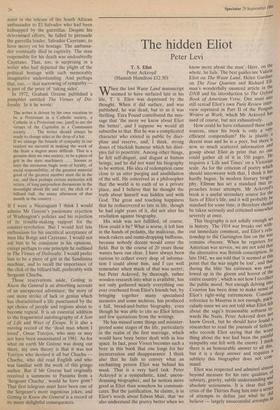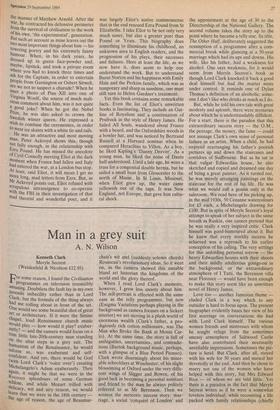The hidden Eliot
Peter Levi
T. S. Eliot Peter Ackroyd (Hamish Hamilton £12.50)
when the lost Waste Land manuscript seemed to have surfaced late in his life, T. S. Eliot was depressed by the thought. When it did surface, and was published, he was dead, but to us it was thrilling. Ezra Pound contributed the mes- sage that 'the more we know about Eliot the better', and I suppose we would all subscribe to that. But he was a complicated character who existed in public by disci- pline and reserve, and, I think, strong doses of blackish humour which his disci- ples fail to penetrate. Among other things, he felt self-disgust, and disgust at human beings, and he did not want his biography to be written. His idea of redemption came close to an utter purging and annihilation of the self. He conceived as a philosopher that the world is to each of us a private place, and I believe that he thought the truth about himself was hidden and with God. The great and touching happiness that he rediscovered so late in life, though he had eight years of it, did not alter his resolution against biography.
His wish was not fulfilled, of course. How could it be? What is worse, it left him in the hands of pedants, the malicious, the muck-rakers and name-dropping buffoons, because nobody decent would enter the field. But in the course of 20 years those waters have run clear. I have always been curious to collect every drop of informa- tion I could about him, and I can well remember when much of that was secret; but Peter Ackroyd, by thorough, rather wooden research into what is available, has not only gathered nearly everything one ever overheard from Eliot's friends but, by bringing together many specialised memoirs and some archives, has produced a full, bread-and-butter biography, even though he was able to cite no Eliot letters and few quotations from the writings.
He has missed some things and misinter- preted some stages of the life, particularly in the realm of the first marriage, which would have been better dealt with in less space. In fact, poor Vivien becomes such a bore in this book that one longs for her incarceration and disappearance. I think also that he fails to convey what an enchanting person Eliot was behind his mask. That is a very hard task. Peter Ackroyd is a sympathetic, kind, uncon- demning biographer, and he notices more good in Eliot than somehow he communi- cates. But the justification, he claims, is in Eliot's words about Edwin Muir, that 'we also understand the poetry better when we
know more about the man'. Here, on the whole, he fails. The best guides are Valerie Eliot on The Waste Land, Helen Gardner on The Four Quartets and Richard Ell- man's wonderfully nuanced article in the DNB and his introduction to The Oxford Book of American Verse. One must also still reread Eliot's own Paris Review inter- view reprinted in Part II of the Penguin Writers at Work, which Mr Ackroyd has used of course, but not exhaustively. How could he have exhausted' these rich sources, since his book is only a very efficient compendium? He is plainly .8 decent man and he is a poet, but there is now so much scattered information and gossip about Eliot •in print that no one could gather all of it in 350 pages. He requires a 'Life and Times' on a Victorian scale. As for the criticism of poetry which should interweave with that, I think it has hardly begun. In modern literary biogra- phy, Ellman has set a standard that re- proaches lesser attempts. Mr Ackroyd 's book is a useful secondary source for the facts of Eliot's life, and it will probably be standard for some time; it therefore should be taken seriously and criticised somewhat severely at once. This biography is not solidly enough set in history. The 1914 war breaks out with- out immediate comment, and Eliot's rela- tionship to the Garsington line on the war remains obscure. When he registers for American war service, we are not told that the alternative was British conscription. In late 1942, we are told that 'it seemed at this point that the war might be lost', and that during the blitz 'his existence was swal- lowed up in the gloom and horror of the entire country', which is not how I recollect the public mood. Not enough delving into , Criterion has been done to make sense 0' Eliot's right-wing extremeness. Constant reference to Maurras is not enoughp,arti- cularly since we are not told what Eliot felt about the sage's treasonable softness to- wards the Nazis. Peter Ackroyd does not know Greek, but he should have found. a researcher to read the journals of Seferis, who records Eliot saying that the worst thing about the war had been the painful sympathy one felt with the enemy. I think there is an honourable answer to all this, but it is a deep answer and requires a subtlety this biographer does not com- mand. Eliot was respected and admired almost. beyond measure for his rare qualities oil sobriety, gravity, subtle understanding an absolute seriousness. It is clear that the crisis of the Thirties flung him into a series
.
of attempts to define just what he d!° believe — largely unsuccessful attempts in
the manner of Matthew Arnold. After the war, he contracted his defensive perimeter from the survival of civilisation to the work of his own, 'the experimental', generation. But such an account as mine leaves out the two most important things about him — his towering poetry and his extremely funny humour. When, in his dark years, he dressed up in green face-powder and, maybe, lipstick, and took a private room where you had to knock three times and ask for the Captain, in order to entertain People from Garsington or Osbert Sitwell, are we not to suspect a charade? When he inset a photo of Pius XII into one of Virginia Woolf, the source of much mali- cious comment about him, was it not quite a good joke? When he got the Nobel Prize, he was also asked to crown the Swedish winter queen. He expressed a wish to combine the ceremonies, in order to wear ice skates with a white tie and tails.
He was an .attractive and most moving man. Peter Ackroyd shows this, though not fully enough, in the relationship with Ezra Pound. He has missed the anecdote of Cyril Connolly meeting Eliot at the dark moment when France had fallen and Italy had entered the war, at a London bus stop. At least, said Eliot, it will mean I get no more long, mad letters from Ezra. But, as Mr Ackroyd points out, Eliot refused with scrupulous intransigence to co-operate with the FBI in their investigation of that mad theorist and wonderful poet, and it was largely Eliot's native commonsense that in the end rescued Ezra Pound from St Elizabeths. I take Eliot to be not only very much saner, but also a greater poet than Pound or Yeats. This biography does something to illuminate his childhood, an unknown area to English readers, and the progression of his plays, their successes and failures. Here at least the life, as we now have it, does seem to help one understand the work. But to understand Burnt Norton and his happiness with Emily Hale and the Perkins family, which was as temporary and sharp as sunshine, one must still turn to Helen Gardner's treatment.
Yet this book contains some remarkable facts. Even the list of Eliot's unwritten books is fascinating. They include an Out- line of Royalism and a continuation of Prufrock in the style of Henry James. He failed All Souls, wandered about France with a beard, and the Oxfordshire woods in a bowler hat, and was noticed by Bertrand Russell at a Harvard seminar when he compared Heraclitus to Villon. As a boy, he liked Kipling's 'Danny Deever'. As a young man, he liked the noise of Dante half understood. Until a late age, he wore a truss for a congenital double hernia, but he sailed a small boat from Gloucester to the north of Maine. In St Louis, Missouri, when Eliot grew up, the water came yellowish out of the taps. It was New England, not Europe, that gave him cultu- ral shock.















































 Previous page
Previous page